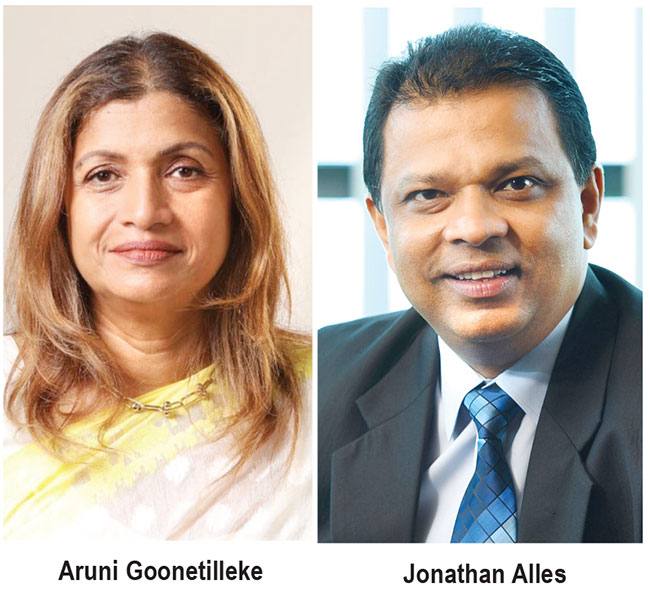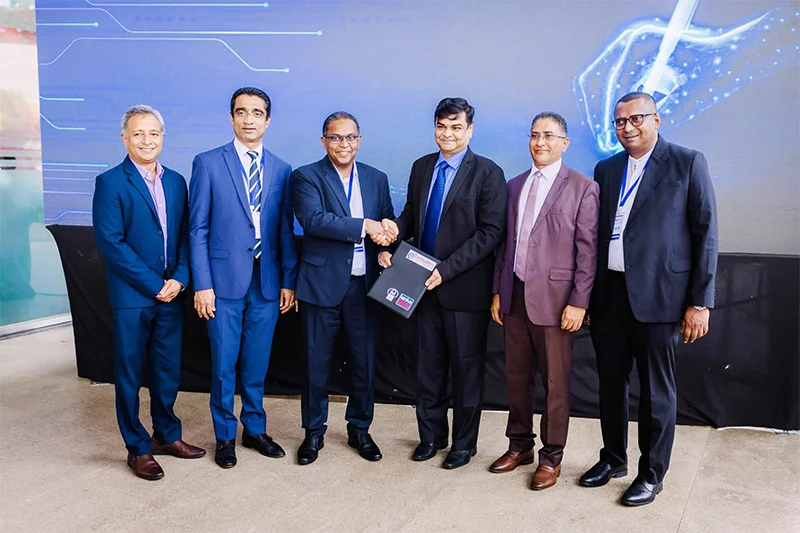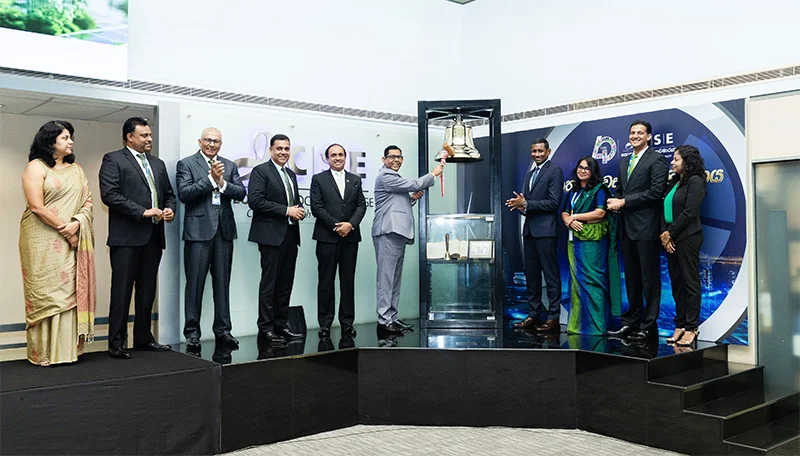Business
‘HNB continues to demonstrate resilience under stressed conditions’

In the backdrop of turbulent market conditions, Hatton National Bank PLC continued to demonstrate resilience, strength and stability, posting a profit before tax of Rs 5.9Bn and a profit after tax of Rs 4.8Bn for the first quarter of 2022 recording a YOY growth of 7% and 3% respectively. At Group level PBT and PAT were at Rs 6.4 Bn and Rs 5.4 Bn respectively.Commenting on the first quarter performance, Aruni Goonetilleke Chairperson of Hatton National Bank PLC, stated that “as Sri Lanka goes through unprecedented times, HNB has yet again demonstrated resilience. At this critical time, I wish to reiterate our commitment to all our stakeholders. As a responsible Domestic Systemically Important bank, ensuring safety, stability and sustainability is our prime focus.”
With the tightening of the monetary policy since August 2021, the AWPLR increased by nearly 400 bps over the 12 months up to March 2022. This enabled the Bank to record a 59% increase in NII during 1Q 2022 compared to the corresponding period of the previous year. The Net Fee income grew by 42% YoY to Rs 3.2 Bn for the first quarter of 2022, driven mainly by improved cards transactions and trade income.The significant devaluation of the rupee as at March 2022, compared to the previous year, resulted in trading gains of approximately Rs 7.5Bn in 1Q 2022. The Bank also, booked an impairment of Rs 7.4Bn against the impact of the currency devaluation on foreign currency denominated loans and investments, which was set-off against the position revaluations.
The Bank’s net stage III loan ratio improved from 2.55% as at December 2021 to 2.41% as at end March 2022 while stage III provision cover increased to 59%, maintaining its position as one of the best in the industry in asset quality. However, considering the significant volatility in macro-economic factors in 1Q 2022, the Bank recognized a higher impairment charge of Rs 13.4Bn. This included an impairment of Rs 6.7Bn on account of investments in foreign currency denominated government securities, subsequent to the announcement made by the Central Bank of Sri Lanka in relation to suspending the repayment of external foreign currency debt obligations of the Government and the sovereign rating downgrade.Operating expenses increased by 21% in 1Q 2022 driven by salary revisions, relatively higher card transaction volumes with the pickup of economic activity and general expenses increasing in line with higher inflation. However, the stronger growth in income, enabled HNB to record a cost to income of 25% during the first quarter of 2022.
HNB’s total tax charge increased by 33% to Rs 2.8Bn for the first quarter. The effective income tax rate increased from 31% in March 2021 to 37% in March 2022 due to the YoY reduction in interest income from foreign currency denominated government securities.Jonathan Alles, Managing Director / Chief Executive Officer of Hatton National Bank PLC stated that, “Sri Lanka has been travelling through a tough terrain over the past few years commencing from adverse weather conditions experienced in 2017-2018 to, unfortunate Easter Sunday attacks in 2019 and then the most unprecedented COVID-19 pandemic which impacted the entire globe. The banking sector of Sri Lanka and HNB has weathered these challenges and emerged strong and stable. Today, Sri Lanka as a nation is facing one of the most challenging times in its history. The next few months would be even more challenging. As such, it is extremely important that we play our part as responsible Sri Lankans at individual, organizational and country level. We believe that the authorities would take necessary steps to ensure political, social, economic and financial stability enabling successful conclusion of discussions with International Monetary Fund, the multilateral organizations and supporting nations to secure much needed funding.”
“It is equally important that we focus on the real economy and sustainable foreign exchange earning avenues that will support us over the medium to long term. Providing necessary support to drive exports, remittances, tourism, manufacturing and industrial development would be key. At the same time, diversifying foreign exchange earning sources would also be important. Focusing on Sri Lanka as an education hub, promoting agri-preneurs, IT, KPO, BPO industries would also be vital in this regard. We need to be cautious about our spending, and purchase local products to support our micro, small and medium enterprises, while at the Government, institutional and corporate level, adopt very tight cost containment measures and slash budgets.”
“As we encounter many obstacles in our day to day life, I would like to place on record my sincere gratitude to each and every member of the HNB team for their continuous commitment and dedication in delivering essential banking services to our valued customers.”(HNB)
Business
Sri Lanka rolls out digital signature framework to accelerate digital economy

Sri Lanka has launched a National Digital Signing Framework, a foundational initiative paving the way for paperless governance. This strategic move eliminates the need for physical signatures and documents in government transactions, aiming to dramatically enhance efficiency, transparency, and accessibility for citizens and businesses. An analyst said that this could accelerate Sri Lanka’s governance and commercial relationships with other countries as traditional signatures make room for digitally signed documents accepted by the government.
In this significant step toward accelerating Sri Lanka’s digital transformation, eMudhra, a global leader in digital identity and security solutions, has entered into a strategic partnership with LankaSign the only Certification Service Provider (CSP) in the country that complies with the Electronic Transactions Act No. 19 of 2006, operated by LankaPay, Sri Lanka’s national payment network during recently held inauguration of INFOTEL 2025 ICT exhibition at Sirimavo Bandaranaike Exhibition Hall.
The LankaSign–eMudhra partnership brings together the strengths of LankaPay’s legally recognized digital signing certificates issued via LankaSign – the pioneering digital Certification Service Provider in Sri Lanka established in 2009 – and eMudhra’s globally trusted emSigner platform, which has enabled secure digital document signing across more than 68 countries since 2008. Through this collaboration, Sri Lankan citizens and businesses will be able to experience a seamless, secure, and user-friendly digital signing solution, enabling documents to be signed anytime, anywhere using iOS, Android, or web-based applications.
This partnership with eMudhra aligns with the national agenda to promote adoption of digital documents, reduce dependency on paper-based processes, and facilitate a more efficient, transparent, and secure digital economy. This collaboration aims to support the government’s long-term digitalization roadmap by enabling a secure digital documentation layer essential for e-government services, digital finance, and digital transformation.
By Sanath Nanayakkare
Business
Dialog & University of Moratuwa launch open-source Sinhala Voice Model

In a significant move to accelerate technological innovation in Sri Lanka, Dialog Axiata PLC, Sri Lanka’s #1 connectivity provider, and the Dialog-University of Moratuwa (UoM) Research Lab, has announced the release of SinhalaVITS, a state-of-the-art, open-source Text-to-Speech (TTS) model for the Sinhala language.
This non-commercial initiative delivers a powerful, high-quality, and natural-sounding Sinhala voice model to the public, making it freely accessible to developers, researchers, and students. The model is available for download on Hugging Face, the world’s largest open-source AI community, empowering anyone to build and experiment with advanced voice technology.
The SinhalaVITS model is the result of a deep-rooted collaboration that unites Dialog’s industry leadership with the academic excellence of the Dialog–UoM Mobile Communications Research Lab, fulfilling a vital need within Sri Lanka’s tech community for accessible, high-performance tools that drive innovation. By removing cost and licensing barriers tied to proprietary software, Dialog is empowering developers and researchers while fostering a more inclusive, collaborative, and future-ready AI ecosystem. This initiative further reinforces Dialog’s commitment to advancing Sri Lanka’s digital future—investing in open-source technology and academic partnerships to nurture local talent and lay the foundation for next-generation digital services built by Sri Lankans, for Sri Lankans.
Business
HNB signals ESG commitment with oversubscribed LKR 10 bn sustainable bonds

The Hatton National Bank PLC (HNB PLC) commemorated raising LKR 10 bn with its first ever issuance of sustainable bonds by way of a market opening ceremony conducted on the trading floor of the Colombo Stock Exchange (CSE) last week.
The 9th December issuance of 100 mn listed, rated, unsecured senior sustainable bonds, in five year and seven-year tenors, with a par value of LKR 100/- and rated “AA-(lka)” By Fitch Ratings Lanka Limited, was oversubscribed on the same day, raising LKR 10 bn.
Sustainable bonds, which were launched in Sri Lanka for the first time this year, are part of a series of GSS+ (Green, Social, Sustainable & Sustainability Linked) debt instruments. The proceeds of the sustainable bond issuance will be used by HNB PLC to fund the development and installation of solar, wind, biomass and hydropower projects, improve energy efficiency through retrofits, fund the construction of recognized ‘green’ buildings, fund investment infrastructure for water treatment, water conservation and efficient agricultural water technologies, finance housing development, healthcare and education for low- and middle-income families, promote women entrepreneurship, amongst others initiatives.
Damith Pallewatte, Managing Director and CEO of HNB PLC, who was the ceremony’s keynote speaker remarked upon the issuance of sustainable bonds commenting: “HNB’s LKR 10 bn sustainable bond issuance is a landmark step in advancing Sri Lanka’s sustainability agenda.”
Delivering his welcome address at the event, Rajeeva Bandaranaike, CEO of CSE, remarked upon rising corporate engagement in CSE’s GSS+ debt instruments stating: “HNB’s Sustainable Bond represents a welcome new addition to the list of leading Sri Lankan financial instruments that have set the example for the success of CSE’s GSS+ Bond framework which have allowed the capital market to operate as a financing vehicle for sustainable and socially equitable projects.”
-

 News2 days ago
News2 days agoMembers of Lankan Community in Washington D.C. donates to ‘Rebuilding Sri Lanka’ Flood Relief Fund
-

 News7 days ago
News7 days agoPope fires broadside: ‘The Holy See won’t be a silent bystander to the grave disparities, injustices, and fundamental human rights violations’
-

 News7 days ago
News7 days agoPakistan hands over 200 tonnes of humanitarian aid to Lanka
-

 Business6 days ago
Business6 days agoUnlocking Sri Lanka’s hidden wealth: A $2 billion mineral opportunity awaits
-

 News6 days ago
News6 days agoArmy engineers set up new Nayaru emergency bridge
-

 News7 days ago
News7 days agoOfficials of NMRA, SPC, and Health Minister under pressure to resign as drug safety concerns mount
-

 News7 days ago
News7 days agoExpert: Lanka destroying its own food security by depending on imported seeds, chemical-intensive agriculture
-

 Editorial7 days ago
Editorial7 days agoFlawed drug regulation endangers lives













